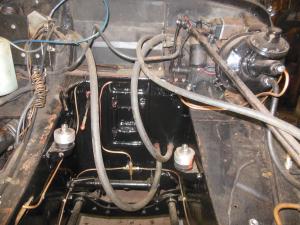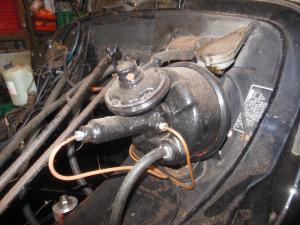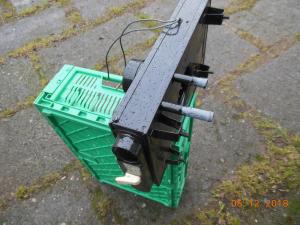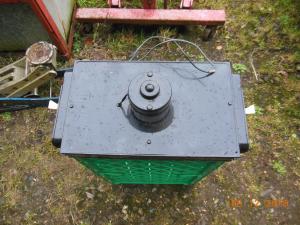Search Results for 'heater'
Traction Owner’s Club › Forums › Search › Search Results for 'heater'
-
AuthorSearch Results
-
31st December 2020 at 12:43 pm #27813
In reply to: 11D Crankshaft end float shims
Jon
ParticipantAfter thinking about it (with the heater on in the garage this time) I realised adding shims increases the end float. I need to reduce it and therefore it’s thrust bearing or surface wear.
Many thanks for the replies. I’ll carry on cleaning and painting!
24th November 2020 at 7:39 pm #27693In reply to: Does anyone have power brakes in an 11?
Richard Larter
ParticipantI fitted a popular after market Lockheed servo. Not enough space on the offside near the master cylinder which would have been easier (Light 15 with twin SU carbs) so I fitted it on the nearside, more pipework and I lost the hot air heater. Main problem was pipe size, the Citroen pipe size is 1/4″ but servos are 3/16″ so adaptors are required.
Cheers Richard

 19th January 2019 at 2:13 pm #24346
19th January 2019 at 2:13 pm #24346In reply to: Slough dash board circa 1950
Jack Peppiatt
ParticipantHello J,
Thank you for your thoughts. I understand your point of view and sentiment and whilst I do not subscribe to the rivet counter view of life, I like to find out what might have been, before innovating for my own needs, in order to keep within the spirit of the original arrangements.
I bought my car in October 2018 and it appealed to me in part because it was relatively unmolested. I am going to fit a wet heater and plan to use an advance retard mechanism to control the flow valve. I am sure you are right about the parts bin approach, since Citroen Slough were dependant upon suppliers, often of parts possibly designed for other manufacturers and certainly by suppliers who had bigger customers.
So my meddling will join that of the previous 9 owners, but I hope it will be ‘in keeping’. Thanks for your thoughts
Jack
8th December 2018 at 9:27 pm #24162In reply to: Heater/Thermostat housing
Richard Larter
ParticipantHi Jack
I have just posted a picture showing the comparison between the Gipsy heater and a Morris Minor heater. As you can see from the picture of the matrix the water pipes can be on each side of the heater box, some are both on one side. I have a spare Gipsy heater if you want it but it will need restoring.
Cheers Richard
6th December 2018 at 7:51 pm #24126In reply to: Heater/Thermostat housing
Jack Peppiatt
ParticipantHello Richard,
Thank you for your photos and further info. The heater looks ideal, slim and would fit the centre of the bulkhead a treat. It looks as if the water pipe are circa15mm and could possibly be shortened.
Anyway thank you I shall have a search for one
Regards Jack
5th December 2018 at 8:46 pm #24123In reply to: Heater/Thermostat housing
Richard Larter
ParticipantHi Jack
Sorry for the delay in measuring the Gipsy heater. The main casing is 340mm long, 200mm wide and 50mm deep. The motor protrudes about 80mm from the casing and there are brackets on the back 35mm deep which give a clearance for the air intake. Some heaters have a single speed motor which is slimmer. I dismantled several Gipsys many years ago and am currently building a flexitor Gipsy with a Land Rover body.
Cheers Richard

 3rd December 2018 at 3:25 pm #24114
3rd December 2018 at 3:25 pm #24114In reply to: Heater/Thermostat housing
Jack Peppiatt
ParticipantDear Alistair and Richard,
Thanks Alistair, if you do have one I would be most interested.
Richard, I think I have found an image of the Gypsy heater, which other than the fan motor which sticks out is appears to be slimmer than the Clayton or smiths version. If you have the heater handy, would you be kind enough to measure and perhaps post a photo please. Where did you source the heater?
Regards to everyone for the invaluable help
Jack
3rd December 2018 at 11:55 am #24111In reply to: Heater/Thermostat housing
Non Member
ParticipantHi Richard, out of interest the previous owner of my car fitted an American made South Wind petrol heater. This works extremely well. Its a ’50’s item which is right for my ’54 car. Here’s one on ebay (albeit in the states). I think John Gillard sourced and fitted it.
David
2nd December 2018 at 7:46 pm #24109In reply to: Heater/Thermostat housing
Richard Larter
ParticipantI plan to fit an Austin Gipsy heater over the winter to my Light 15. It is a rectangular design with flaps at each end and fairly slim so it will not intrude too much. The car runs cool even on the M25 in the summer so a thermostat will be needed, either fitted in the top hose or in a separate housing. The housing from a Rover with a K series engine looks like a possibility.
Cheers Richard
30th November 2018 at 9:04 pm #24103In reply to: Heater/Thermostat housing
Jack Peppiatt
ParticipantThank you Alistair and David. Alistair I had seen your post on the subject and agree with you both that the Clayton heater would look right and is a period correct accessory. I have bid on a couple recently on eBay, however the seem to reach around £150 and I was enquiring if an alternative had been used, other than perhaps the Morris Minor circular Smiths heater.
I am surprised that the heater works efficiently without a thermostat, I have a 1934 Wolseley Hornet Special, to which a Smiths heater has been fitted, however the engine, despite having no fan just a water pump, the heater did not get hot in winter until I added a thermostat.
Thanks for your thoughts, I will keep looking for Clayton, I like the look of them.
Thanks Jack
30th November 2018 at 8:13 pm #24102In reply to: Heater/Thermostat housing
David Selfridge
ParticipantI have also fitted a Clayton Heater useing a tee from the top and bottom radiator hoses and fitted through the existing heater opening in the bulkhead. The Pics in Alistair’s post are the same way that I had my heater fitted, as I had a new piece of red carpet left over, I wrapped the hoses (in the cabin) with the carpet, held in place with fine cable ties for easy removability, just in case a jubilee clip would start leaking. The Clayton works well in summer and winter without a thermostat, in the winter the heater stops the windshield from steaming up inside, so no need for additional tubes or electrical elements. It’s also a cheap fit, as they come new at a fairly reasonable price or you could get a very good secondhand one, I think most land rovers had them fitted and possibly the Morris Minor?
Davy
29th November 2018 at 9:58 pm #24101In reply to: Heater/Thermostat housing
Alistair
ParticipantType heater into the search bar and you will see some pictures I put on the forum of my Light 15 hook-up. The Clayton heater is mounted on the bulkhead between the driver and passenger. Uses the bolts from the engine mount. I find it very efficient, if not, too warm!
https://traction-owners.co.uk/forums/search/heater/
Alistair
29th November 2018 at 11:45 am #24100Topic: Heater/Thermostat housing
in forum Bodywork & interiorJack Peppiatt
ParticipantI would like to fit a heater to my light 15 (Smiths or Claydon for instance) because I use the car except when there is salt on the roads. I have read the articles in the magazine, but am enquiring about what heater and source others may have found and fitted and what, if any, solution you may have discovered about a thermostat housing. I am not inclined to fit one of the in-hose thermostats, preferring if possible a metal or plastic housing with side take off for heater supply.
photos would be welcome if you have them please
Thank you in anticipation
I am also looking for a scrap square Jaeger clock, needing the flexible hand adjuster for my otherwise working clock.
10th June 2018 at 6:43 pm #23112In reply to: Steering Column Bushing
David Selfridge
ParticipantPeter, My Traction is a Slough 1938 Light 12
Thanks to all for answering my post. If my memory serves me right, some time ago someone posted about this problem and they used heater hose to replace steering column bushes, at the time it did not affect me so did not take much notice.
Davy
1st November 2016 at 9:57 pm #7698In reply to: Connection for heater
Anonymous
Thanks guys there is a lot of useful info in the post
Nigel
-
AuthorSearch Results
